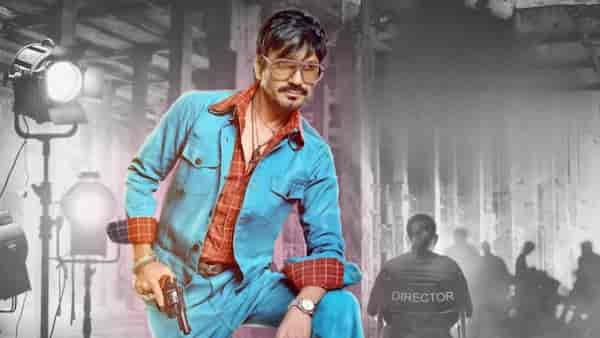Newsletter | Tiku Weds Sheru To Jogira Sara Ra Ra, Casting Nawazuddin Siddiqui As King Of Hearts
There is something awkward, but also liberating, in having Nawazuddin Siddiqui shoulder the role he looks most ill-equipped to pull off: the romantic hero. Manik Sharma writes.

Last Updated: 12.20 PM, Jul 05, 2023
This column was originally published as part of our newsletter The Daily Show on July 5, 2023. Subscribe here. (We're awesome about not spamming your inbox!)
***
“HUSBAND aur boyfriend material toh hun nahi main,” says Jogi, played by Nawazuddin Siddiqui in the recently released Jogira Sara Ra Ra. A small-town wedding planner, Jogi, as is typical of most of Siddiqui’s roles, wears his conservative heart on his sleeve. He berates his large family, especially his sisters, for desiring freedom and agency, but is secretly drawn to a woman who commands some. Roughly three weeks after the release of the film, Siddiqui returned in Prime Video’s Tiku Weds Sheru, as the daydreaming, reluctant hustler Sheru. Both roles — at least in their stiff designs — are cut from the dense cloth that the actor has used to essay roles in the past. Both, however, also try to free him from the rigid interpretation of his talent.
For the conventionally aligned, our imagination of love and romance has been propelled by chiselled bodies that move fluidly. Love is not a preoccupation but a distant accident that more or less eludes either our route or our sense of comprehension. Instead, we have cinema to guide us, tell us what it could look like, albeit as a form of flattery rather than a candid representation.
Thus, there is something grating, but also liberating, about asking Siddiqui to shoulder a role he looks most ill-equipped to pull off: the romantic hero. The results thus far have been mixed, but it’s an experiment worth considering and repeating for the sake of redefining our own fantasies about love’s colourful geometry.
In mainstream Hindi cinema through the decades, love has been very infrequently depicted sans its typical accoutrements of beauty and handsomeness. It’s probably why, in the age of character actors, love stories have become a harder sell. Heroes and heroines have receded to the background, as characters seemingly raised from within us, have somewhat mutedly taken to the fold of romance. There aren’t as many dance numbers, creamy expressions of affection, or the smooth glide of meet into cute, so to speak. Instead, our anxieties — even prejudices — have become cornerstones of modern storytelling where the cage of love no longer imprisons the meaning of life. The romantic story, and our ideas of the people who will represent these stories, thus require a reset.

The Nawazuddin Siddiqui-as-a-romantic hero experiment may not be for everyone, but it has yielded wildly interesting results. In Ritesh Batra’s Photograph, the actor played a somewhat muted, sombre version of the archaic romantic hero. It’s also a story of two underdogs, misfits trying to interpret the whispery geography of a world that otherwise speaks in a coarse register. Moreover, Photograph also exhibits a side of the actor where his most mercurial bits don’t fly off of his usually acerbic lips. They simply rest on his vacant face, gradually succumbing to the audacity of fashioning a dream, let alone pursuing one. It’s no small journey, from playing a paedophile in Haraamkhor.
Both of Siddqui’s latest films try to be comedies but falter, not because the actor can’t pull off a joke — of course he can — but because they try to make up with forceful, exuberant ripostes, that which the script cannot with conviction present through the tropes of a conventional romance. In Tiku Weds Sheru, Siddiqui’s perms, his flashy sunglasses appear to be cocky ironies rather than motifs the makers actually believe in. In Jogira Sara Ra Ra, the cultural canvas is rural and closer to the actor’s comfort zone, but fails to carve for him a path that would redirect us to a fresh understanding of the actor, if not the very idea of who ought to be allowed to yearn for love. (In Tiku…, he actually plays a film extra hoping to find and act in his own film.) The fact that in both films, the women are pretty motormouths slightly undermines the conceit of having someone wiry and rough around the edges play an object of affection. Ultimately, the results don’t justify the apparatus.
In both Tiku… and Jogira…, Siddiqui does a dance number. His inadequacy with the bodily demands of a dance step are evident, as he struggles to swivel his hips and match the rhythms of his co-performers. But it does tease a more discourteous view of the romantic hero. Discourteous to our fantasies about him. Because why can’t men or women, ineligible for Hindi cinema’s storied yet tired tropes qualify for the dreamy treatment that the conventionally handsome hero attracts? Why must we mandate our love stories to sieve through familiar grammar that might have given us fantasies to aspire to, but has rarely offered us characters that capture our negotiations with reality? Negotiations that, for most of us, begin at birth.
Things have supposedly shifted in this category with people as diverse as Pankaj Tripathi, Kumud Mishra and now Nawazuddin Siddiqui taking to the kind of roles previously reserved for the youthful, shapely and the manicured. Not all of these experiments have covered themselves in cinematic glory, but in the wider context of reorienting us to a more acceptable, if unsexy view of love, these should be seen as opportunities as opposed to gimmicks or oddities.

 Premium
Premium